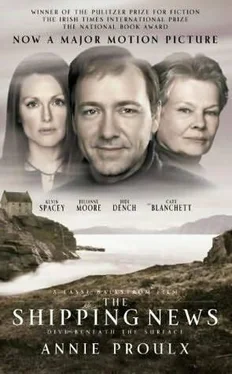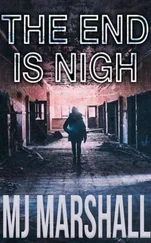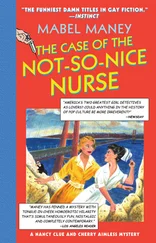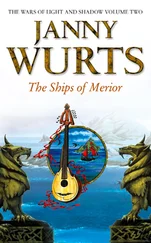But now they said that hard life was done. The forces of fate weakened by unemployment insurance, a flaring hope in offshore oil money. All was progress and possession, all shove and push, now. They said.
Fifteen she was when they had moved from Quoyle’s Point, seventeen when the family left for the States, a drop in the tides of Newfoundlanders away from the outports, islands and hidden coves, rushing like water away from isolation, illiteracy, trousers made of worn upholstery fabric, no teeth, away from contorted thoughts and rough hands, from desperation.
And her dad, Harold Hamm, dead the month before they left, killed when a knot securing a can hook failed. Off-loading barrels of nails. The corner of the sling drooped, the barrel came down. Its iron-rimmed chine struck the nape of his neck, dislocated vertebrae and crushed the spinal column. Paralyzed and fading on the dock, unable to speak; who knew what thoughts crashed against the washline of his seizing brain as the kids and wife bent over, imploring Father, Father. No one said his name, only the word father , as though fatherhood had been the great thing in his life. Weeping. Even Guy, who cared for no one but himself.
So strange, she thought, going back there with a bereaved nephew and Guy’s ashes. She had taken the box from sobbing Quoyle, carried it up to the guest room. Lay awake thinking she might pour Guy into a plastic supermarket bag, tie the loop handles, and toss him into the dumpster.
Only a thought.
Wondered which had changed the most, place or self? It was a strong place. She shuddered. It would be better now. Leaned on the rail, looking into the dark Atlantic that snuffled at the slope of the past.
“A Rolling Hitch will suffice to tie a broom that has no groove,
provided the surface is not too slick.”
THE ASHLEY BOOK OF KNOTS

ON THE floor behind the seat Warren groaned. Quoyle steered up the west coast of the Great Northern Peninsula along a highway rutted by transport trucks. The road ran between the loppy waves of the Strait of Belle Isle and mountains like blue melons. Across the strait sullen Labrador. Trucks ground east in caravans, stainless steel cabs beaded with mist. Quoyle almost recognized the louring sky. As though he had dreamed this place once, forgot it later.
The car rolled over fissured land. Tuckamore. Cracked cliffs in volcanic glazes. On a ledge above the sea a murre laid her single egg. Harbors still locked in ice. Tombstone houses jutting from raw granite, the coast black, glinting like lumps of silver ore.
Their house, the aunt said, crossing her fingers, was out on Quoyle’s Point. The Point, anyway, still on the map. A house empty for forty-four years. She scoffed, said it could not still stand, but inwardly believed something had held, that time had not cheated her of this return. Her voice clacked. Quoyle, listening, drove with his mouth open as though to taste the subarctic air.
On the horizon icebergs like white prisons. The immense blue fabric of the sea, rumpled and creased.
“Look,” said the aunt. “Fishing skiffs.” Small in the distance. Waves bursting against the headlands. Exploding water.
“I remember a fellow lived in a wrecked fishing boat,” the aunt said. “Old Danny Something-or-other. It was hauled up on the shore far enough out of the storm and he fixed it up. Little chimney sticking up, path with a border of stone. Lived there for years until one day when he was sitting out in front mending net and the rotten hull collapsed and killed him.”
The highway shriveled to a two-lane road as they drove east, ran under cliffs, passed spruce forest fronted by signs that said NO CUTTING. Quoyle appraised the rare motels they passed with the eye of someone who expected to sleep in one of them.
¯
The aunt circled Quoyle’s Point on the map. On the west side of Omaloor Bay the point thrust into the ocean like a bent thumb. The house, whether now collapsed, vandalized, burned, carried away in pieces, had been there. Once.
The bay showed on the map as a chemist’s pale blue flask into which poured ocean. Ships entered the bay through the neck of the flask. On the eastern shore the settlement of Flour Sack Cove, three miles farther down the town of Killick-Claw, and along the bottom, odds and ends of coves. The aunt rummaged in her black flapjack handbag for a brochure. Read aloud the charms of Killick-Claw, statistics of its government wharf, fish plant, freight terminal, restaurants. Population, two thousand. Potential unlimited.
“Your new job’s in Flour Sack Cove, eh? That’s right across from Quoyle’s Point. Looks about two miles by water. And a long trip by road. Used to be a ferry run from Capsize Cove to Killick Claw every morning and night. But I guess it’s closed down now. If you had a boat and a motor you could do it yourself.”
“How do we get out to Quoyle’s Point?” he asked.
There was a road off the main highway, the aunt said, that showed as a dotted line on the map. Quoyle didn’t like the look of the dotted line roads they passed. Gravel, mud, washboard going nowhere.
They missed the turnoff, drove until they saw gas pumps. A sign. IGS STORE. The store in a house. Dark room. Behind the counter they could see a kitchen, teakettle spitting on the stove. Bunny heard television laughter.
Waiting for someone to appear, Quoyle examined bear-paw snowshoes. Walked around, looking at the homemade shelves, open boxes of skinning knives, needles for mending net, cones of line, rubber gloves, potted meats, a pile of adventure videos. Bunny peered through the freezer door at papillose frost crowding the ice cream tubs.
A man, sedge-grass hair sticking out from a cap embroidered with the name of a French bicycle manufacturer, came from the kitchen; chewed something gristly. Trousers a sullen crookedness of wool. The aunt talked. Quoyle modeled a sealskin hat for his children, helped them choose dolls made from clothespins. Inked faces smiled from the heads.
“Can you tell us where the road to Capsize Cove is?”
Unsmiling. Swallowed before answering.
“Be’ind you aways. Like just peasin’ out of the main road. On a right as you go back. Not much in there now.” He looked away. His Adam’s apple a hairy mound in his neck like some strange sexual organ.
Quoyle at a rack of comic books, studied a gangster firing a laser gun at a trussed woman. The gangsters always wore green suits. He paid for the dolls. The man’s fingers dropped cold dimes.
¯
Up and down the highway three times before they spied a ruvid strip tilting away into the sky.
“Aunt, I don’t think I can drive on this. It doesn’t look like it goes anywhere.”
“There’s tire tracks on it,” she said, pointing to cleated tread marks. Quoyle turned onto the sumpy road. Churned mud. The tire marks disappeared. Must have turned around, thought Quoyle, wanting to do the same and try tomorrow. Or had dropped in a bottomless hole.
“When are we gonna get there?” said Bunny, kicking the back of the seat. “I’m tired of going somewhere. I want to be there. I want to put on my bathing suit and play on the beach.”
“Me too.” Both throwing themselves rhythmically against the seat.
“It’s too cold. Only polar bears go swimming now. But you can throw stones in the water. On the map, Aunt, how long is this road?” Hands ached from days of clenching.
She breathed over the map awhile. “From the main road to Capsize Cove is seventeen miles.”
Читать дальше












